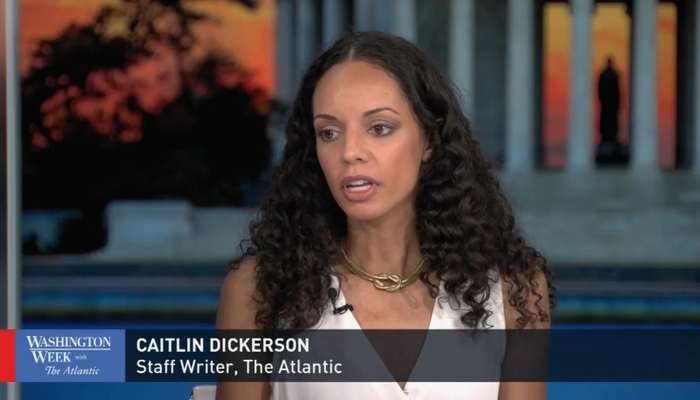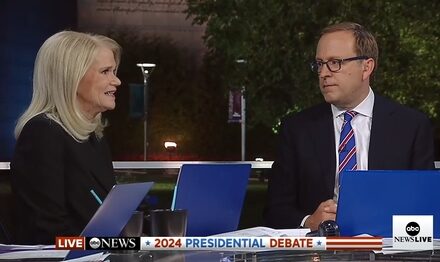We support our Publishers and Content Creators. You can view this story on their website by CLICKING HERE.

The latest Washington Week with The Atlantic, the journalistic political roundtable airing every Friday evening on tax-funded PBS, featured Atlantic magazine journalist Caitlin Dickerson accusing Donald Trump of not just racism, but using the rhetoric of “fascist neo-Nazi groups,” for his insistence on enforcing the borders and lowering immigration levels from certain world regions.
This is PBS in fall campaign mode, as in “don’t vote for the neo-Nazi!”
Host Jeffrey Goldberg: So, Caitlin, you have tracked more than anyone I know Trump policies, the Trump record during his term in office, and the ideological leanings, or the language used to talk about immigration and immigrants, starting with Donald Trump, but Stephen Miller, and, of course, the whole coterie of people around them who focused on immigration. I`m wondering if that language that you heard strikes you as harsher than what we’ve heard before….
Caitlin Dickerson, Staff Writer, The Atlantic: Harsh, I want to say, isn’t even strong enough. It`s not — this isn`t a spectrum of escalation about becoming harsher against immigration in a punitive way. I think, really, it`s a transformation toward very bald expressions of racism and xenophobia.
I mean, I think that tape was Trump all but saying, when he points to people from the Congo, the Middle East and Asia, and then says they`re destroying the fabric of our country, what is that? What is the fabric meant to, refer to? It refers to whiteness, right? And not only that, he’s obviously said on the campaign trail, as you know, immigrants are poisoning the blood of America, that they’re animals, that they’re not human. I mean this is the territory of fascist neo-Nazi groups….
Trump was referring to the bloodthirsty MS-13 gang as animals, as Dickerson surely knows and even liberal fact-checkers admitted. Is Dickerson really opposed to harsh language being applied to MS-13?
Goldberg: ….I think you’re suggesting that Trump, in these last weeks of the election, is moving closer to articulating the Great Replacement Theory, the so-called Great Replacement Theory, that there’s a plot, and, obviously, sometimes it’s considered a Jewish plot, sometimes it`s just sort of a general plot, to literally replace the whites of America with brown and black people.
Dickerson: That’s exactly right.
Goldberg: I mean, do you — is that what you’re hearing, like we’re moving toward, which is of course, not a right-wing position, it’s kind of an authoritarian?
Dickerson: That`s exactly what I`m saying, and why I think harsh is not a strong enough word to describe the language that Trump is using. I mean, so the Great Replacement Theory has always been on the scene in Trump’s political career….
Politico certainly took the idea of immigrants voting Democrat seriously in a 2013 article, “Immigration reform could be bonanza for Democrats.” Is Politico also right-wing?
Goldberg then asked the Washington Post’s Leigh Ann Caldwell, “what is the utility of going more racist in the weeks leading up to the election?” After Caldwell answered, Dickerson again piped up by throwing up an old accusation. “To basically scare them off of the couch, right? I mean in that sense, it’s a Willie Horton type” of attack.
Back in 1988, the Left thought it was somehow racist for Republicans to talk about a black man convicted of a vicious gas-station murder getting a weekend furlough from Gov. Michael Dukakis. Horton traveled to Maryland and kidnapped a young couple, stabbing the man and repeatedly raping his girlfriend.

 Conservative
Conservative  Search
Search Trending
Trending Current News
Current News 





